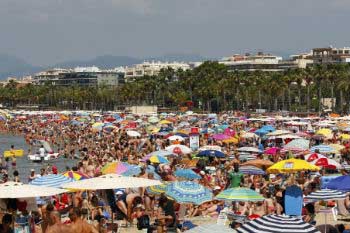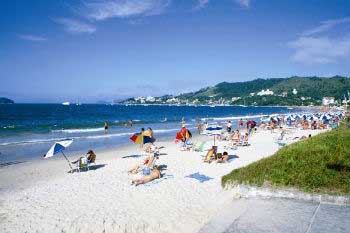We find different methods of rating the environmental quality of beaches, which give them rates through which we can get an idea of whether we have chosen the right holiday destination we had planned. Furthermore, we help to reduce the ecological footprint by taking care of the environment with measures like the right waste disposal.
Thus, we will not only enjoy the best beaches but we also help reduce pollution.
What are these environmental standards for swimmers?
Internationally, we find two systems with the same objective –a blue flag and a demanding ISO 14001 certification. Also, we can now follow here in Spain the famous “Q” for quality.
Blue flags, international certification
emerged in 1985 in French coastal municipalities. Subsequently, the evaluation criteria were unified, creating in 2006 an international system of assessment applicable to more than 48 countries.

Blue flags are granted by an international jury –chaired by the Foundation for Environmental Education – with the participation of the UN Agencies for Environment and Tourism. In 2013 a total of 3,729 blue flags were granted worldwide (3,100 beaches and 629 ports) in the northern hemisphere and for the first time countries like Israel and Mexico have been incorporated into the list.
What measures the blue flag?
Blue Flag status is granted to countries in Europe, South Africa, New Zealand, Canada and the Caribbean. We find for example in Brazil, the International Jureré Beach (on Florianópolis island), or Spanish Cathedrals Beach (Galicia).
Blue flags are awarded measuring criteria require compliance with standards: water quality, safety, general services and environmental management.
ISO 14001 –Another international implementation
What do these regulations consist of? It includes several points to review and promote, such as improving the selective waste collection, controlling water and electricity expenses, carrying out water and sand analyses regularly, using methods of sand cleaning, handing out information to beachgoers and increasing security, among others.

Thus, getting this certification through these controls and improvements means that you are sure of having chosen a beach in the best conditions, while at the same time it means better environmental care.
Some of the beaches with this international certification, are located in the Basque Country (Spain) and Arrigunaga or Ereaga in Getxo, or Plentzia or Bakio at Bermeo. We can also find, for example, beaches seeking this certification in Mexico, such as Solidaridad Beach.
In Spain, Q for tourist quality
In Spain, sun and beach holiday tourism attracts 75% of the tourists who visit this country every year, hence considering the importance of quality in facilities and services. In the first six months of 2014 Spain has received 28 million international tourists, so getting and keeping this Q for quality is essential to keep this level of income from tourism.
The establishments supported by the "Q for Quality" have passed strict audits to ensure that their service delivery is guarantee of quality, safety and professionalism. All this to assure customers the best possible travel experience caring environment.
Source: Blue flag.